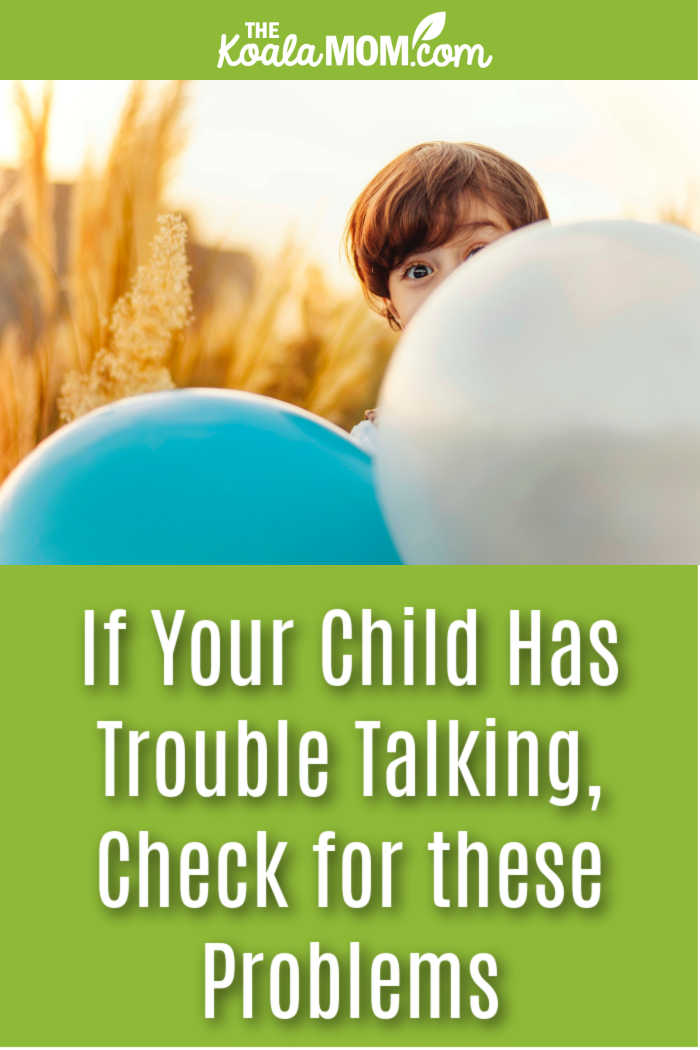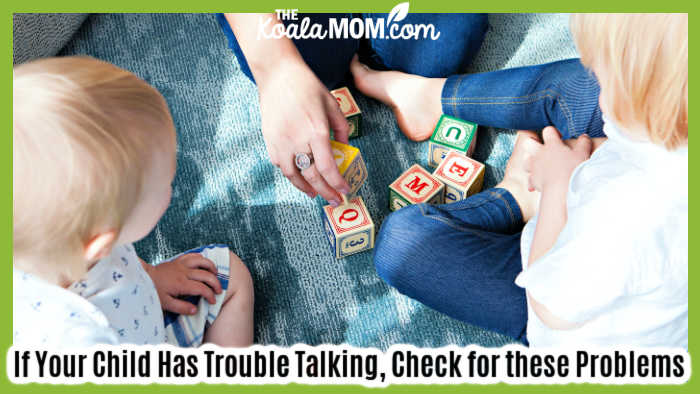While many of us laugh at the way our toddlers say certain words, it can be challenging when a child has trouble speaking clearly. Speech and language issues, such as stuttering or sound distortions, can be embarrassing for young children to deal with. It can also be very frustrating for a child to be trying to communicate wants or needs to a caregiver who cannot understand what they are saying due to the child’s speech delays.
If you’ve noticed that your child has difficulty expressing themselves verbally, there might be an underlying physical condition causing the problem. Knowing what some of these conditions are will help you work out if there’s something going on that needs further investigation from a doctor. In this blog post, we’ll explore some of the most likely causes behind a child having difficulty talking and how you should move forward in addressing them.

Identify the Specific Problem
As parents, we eagerly anticipate our child’s first words, but what should we do if we notice that they are struggling to produce sounds or say words? It’s important to pay attention to any signs that your child is having difficulty with speech, such as avoiding certain sounds or struggling to pronounce words correctly. They may also have trouble forming sentences or speaking fluently.
Take some time to listen to your child’s speech and try to identify the patterns you notice. For example, write down specific words your child cannot say. It can also be useful to have your child interact with other adults, who may not be used to listening to your child as much as you do. You may be used to “interpreting” your child’s speech and be unaware of how hard they are for someone outside the family to understand.
If you are concerned about your child’s language development, it’s important to consult with a paediatric speech pathologist who can help identify any potential issues and provide appropriate support and therapy. Remember, early intervention can make a significant difference in helping your child develop strong communication skills and reach their full potential. If you are unsure where to start, your child’s pediatrician can be a great resource for finding the right professional.
Understand Possible Causes of Speech and Language problems
Language development is essential for successful communication and social interaction. However, up to 10% of children experience speech and language problems, which can significantly impact their ability to communicate effectively. These problems can arise due to a variety of factors, including hearing loss, developmental delays, autism spectrum disorder, intellectual disabilities, and motor skills.
It’s essential to understand the underlying causes of these issues to provide tailored interventions and support to those who may need it. By identifying these difficulties at an early stage, it’s possible to implement early interventions to help children overcome language challenges and support them in achieving their full potential. When in doubt, it’s important to consult with a specialist to ensure the best possible outcomes.
Encourage Your Child to Practice Speaking
Speech delays and language issues can be difficult to cope with, but they don’t have to be a permanent problem. With some help from parents and loved ones, children can learn how to communicate in effective ways.
Encourage your child to practice speaking in different environments, such as at home and in social settings. Use everyday activities as an opportunity for them to talk about what they’re doing or how they’re feeling. Praise their efforts and provide positive reinforcement whenever possible so that they can build up their confidence and learn to express themselves clearly.
Additionally, read books with your child to help them understand new words and concepts. This will give them the opportunity to improve their language skills and learn how to communicate effectively.
Know When to Seek Professional Help
Communication is an essential part of our everyday lives. It enables us to connect with others, express ourselves, and build relationships. However, some children may have difficulty expressing themselves verbally due to language issues or speech delays. If you believe that your child is having difficulty with their communication, it’s important to seek professional help from a specialist.
While children learn at their own pace and may reach developmental milestones at different ages, it’s important to be aware of these milestones. HealthLinkBC explains, “Although speech and language continue to develop through adolescence, children usually reach major milestones in predictable stages by 6 years of age. The exact pace at which speech and language develop varies among children, especially the age at which they begin to talk.”
A qualified speech pathologist can assess the problem and provide tailored interventions and therapies for your child. They can also provide guidance on how to best support your child in achieving language milestones and helping them reach their full potential.
Explore non-medical ways to help your child
As a parent, it can be difficult to watch your child struggle with speech and language difficulties. But there are many ways you can help them without having to resort to medical interventions. Encouraging your child to use toys, games, and art can provide fun activities that also serve as a platform for communication and expression. Listening to music or engaging in conversations about their interests can also help boost their communication skills. Also, consider taking up a hobby together that they can practice and grow in as they develop better language skills.
Learn about different treatments available
For individuals experiencing difficulties with communication, there are a variety of treatments available to help improve their symptoms. Speech therapy is a popular treatment option that involves working with a trained professional to develop communication skills and improve language abilities. Another option is sign language, which can be helpful for those who struggle with verbal communication or are deaf. Physical therapy can also be useful for conditions affecting the muscles involved in speaking or swallowing.
Additionally, medications may be prescribed to manage symptoms related to speech and language difficulties. With so many options available, it’s important to work with a healthcare professional to determine the best course of treatment for each individual’s unique needs.
Discover helpful resources
Raising a child is one of the most rewarding experiences in life, but it can also be challenging. Communication issues can arise, leaving parents feeling helpless and unsure of how to support their children. Fortunately, there are many helpful resources available to address these challenges. Books on children’s communication issues provide valuable insight into how to identify and handle various communication obstacles.
Additionally, online support groups allow parents to connect with others who are going through similar experiences. These groups provide a safe space for parents to share their struggles, ask questions, and receive guidance from those who have been there before. With the help of these resources, parents can confidently support their child’s communication development and help them thrive.

Through early identification and understanding of possible causes, detecting any signs of a speech and language disorder, exploring non-medical ways to help your child, and researching treatments and resources available, parents can provide methods to bolster their child’s communication skills. While it may be worrisome to hear that your child is having difficulty producing sounds or speaking in sentences, seeking professional help is neither impossible nor embarrassing.
Parents need not feel guilty about being unable to come up with a solution; trust that alongside the many professionals available, there are plenty of resources out there that you won’t have to look too hard for. Most importantly remember that every parent wants the best for their child – strive towards this goal through open communication and education about speech and language development.

No Responses Yet